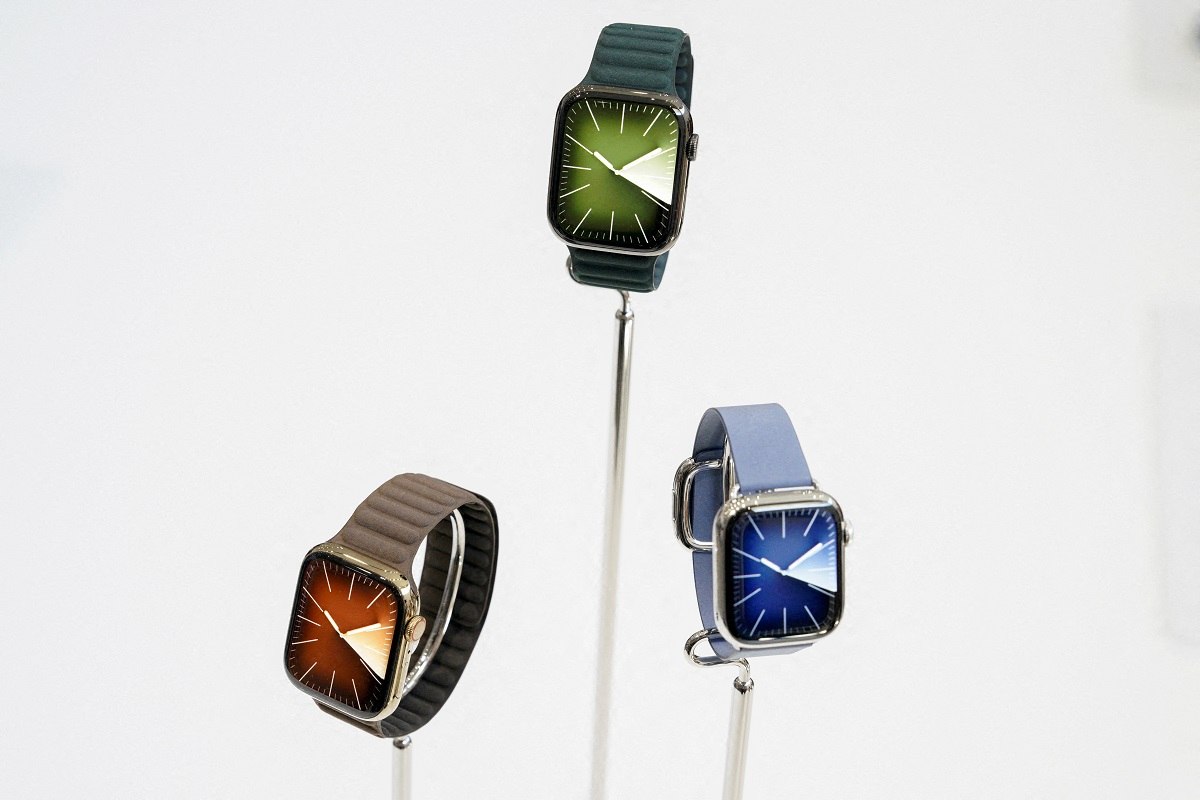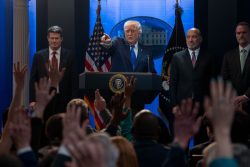
New Apple Watches Ultra 2 are displayed during the ‘Wonderlust’ event at the company’s headquarters in Cupertino, California, U.S. September 12, 2023.
12:55 JST, December 20, 2023
Three months ago, Apple hailed its latest smartwatches, the Watch Ultra 2 and the Watch Series 9, as “capable” and “advanced” additions to its sprawling array of gadgets.
Now, the company is preparing to halt sales of both new watches entirely – and no one is sure for how long.
On Tuesday, Apple confirmed the devices would not be available from its online store starting this week, or in Apple stores starting the day before Christmas, because of “an order from the U.S. International Trade Commission on a technical intellectual property dispute.” And at the heart of that order is a feature found in recent Apple Watches that monitors the user’s blood oxygen levels.
“Should the order stand, Apple will continue to take all measures to return Apple Watch Series 9 and Apple Watch Ultra 2 to customers in the U.S. as soon as possible,” the company said in a statement.
While the announcement may have come as a surprise to some last-minute holiday shoppers, it’s the culmination of nearly a decade of tension between one of the world’s leading device makers and a medical technology company that, in another timeline, may have been a valued partner.
Here’s what you should know.
What does this mean for you?
If you were planning on picking up one of the affected Apple Watch models as a last-minute holiday gift, you’ll have at least one fewer place to purchase from.
Apple said that, in an attempt to preemptively “comply with the ruling,” it will stop selling the Watch Ultra 2 and Watch 9 on Apple.com after 3 p.m. Eastern time on Dec. 21. (That’s because Apple has to take shipping into account – for compliance reasons, the affected products have to be in people’s hands before Dec. 26, not just in transit.)
The company will also stop selling those devices inside physical Apple stores after Dec. 24.
That said, the ITC ruling that calls for a sales ban only applies to Apple itself. Retailers that already have ample supply of these products – say, Target, Best Buy or Amazon – can continue selling them as usual as long as they have inventory. The catch? That ruling also calls for an import ban, which would prevent Apple from bringing Apple Watches assembled overseas into the United States.
This ruling only puts limits on Apple’s importing and sales of affected devices in the U.S., so customers abroad don’t have anything to worry about. Apple says there should be no impact on earlier Apple Watch models that include the blood oxygen feature.
Can President Biden stop this?
Yes, if he really wanted to. The president of the United States does have the authority to veto ITC rulings with a 60-day review period, with this most recent one ending on Dec. 25. While such vetoes happen infrequently, they do happen.
In fact, the last time a sitting president overturned an ITC decision involved Apple too. In August 2012, President Barack Obama vetoed an ITC import ban on the iPhone 4 and certain iPad models after a protracted patent battle between Apple and Samsung. (Just days later, the ITC banned certain older Samsung devices from being imported too, which Obama didn’t contest.)
Apple may be hoping Biden does the same here, but recent history isn’t on the company’s side.
Late last year, the ITC found that Apple had infringed on another set of health tech patents, this time held by AliveCor, a company that makes personal electrocardiogram (ECG) sensors that monitor a user’s heart rhythm. Apple also faced an import ban as a result, and the Biden administration made clear it wouldn’t overturn that ruling in February.
The only reason Apple Watches remained on sale was an ongoing debate over whether some of AliveCor’s patents were valid in the first place.
Now, Biden is nearing the end of the review period, and while he is said to be “tracking” the issue as reported by Bloomberg, there’s been little to suggest so far that he would choose to act differently this time.
What can Apple do about all of this?
Apple said in a statement that it is “pursuing a range of legal and technical options” to address the issue and resume sales of its popular smartwatches, though it declined to talk about specific plans. But it has a few different options.
Bloomberg reports that a massive internal effort is underway to modify how the Apple Watch measures and displays its blood oxygen data, though a mere software update may not be enough to satisfy everyone. Apple has also used settlements and licensing deals to quell patent brawls in the past, as it did with Qualcomm with 2019.
The company says it will provide additional information at the end of Biden’s review period. For now, though, it’s unclear what form the company’s fixes will take or how long it will take to deliver them.
What’s the backstory here?
To get the full scope of the drama, we have to turn the clock back ten years.
In 2013, Masimo, a health tech company based in Irvine, Calif., developed a mobile pulse oximeter (a sensor for tracking oxygen levels in your blood) that could be paired for use with the iPhone, iPad and iPod touch.
After the announcement, a Wall Street Journal report found, an Apple executive reached out to Masimo to discuss how the iPhone maker “could or should” integrate some of Masimo’s tech into future products.
While those conversations unfolded, Apple hired dozens of Masimo’s employees, including Michael O’Reilly – the Masimo chief medical officer who, shortly thereafter, became Apple’s vice president of medical technology.
Fast forward to 2020, and the tension between the two companies came to a head. In January of that year, Masimo sued Apple alleging (among other things) misappropriation of trade secrets and patent infringement.
Later that same year, Apple unveiled the Apple Watch Series 6, its first wearable with – you guessed it – a tiny, integrated pulse oximeter. (As we found shortly after launch, the feature could at times be inaccurate.)
While that first lawsuit ended in a mistrial, the legal battles between the companies didn’t end there. Apple then sued Masimo in Delaware, but a second, successful patent infringement lawsuit Masimo filed with the ITC prompted the import and sales ban Apple is now facing.
Top Articles in News Services
-

Survey Shows False Election Info Perceived as True
-

Hong Kong Ex-Publisher Jimmy Lai’s Sentence Raises International Outcry as China Defends It
-

Japan’s Nikkei Stock Average Touches 58,000 as Yen, Jgbs Rally on Election Fallout (UPDATE 1)
-

Japan’s Nikkei Stock Average Falls as US-Iran Tensions Unsettle Investors (UPDATE 1)
-

Trump Names Former Federal Reserve Governor Warsh as the Next Fed Chair, Replacing Powell
JN ACCESS RANKING
-

Producer Behind Pop Group XG Arrested for Cocaine Possession
-

Japan PM Takaichi’s Cabinet Resigns en Masse
-

Man Infected with Measles Reportedly Dined at Restaurant in Tokyo Station
-

Israeli Ambassador to Japan Speaks about Japan’s Role in the Reconstruction of Gaza
-

Videos Plagiarized, Reposted with False Subtitles Claiming ‘Ryukyu Belongs to China’; Anti-China False Information Also Posted in Japan























